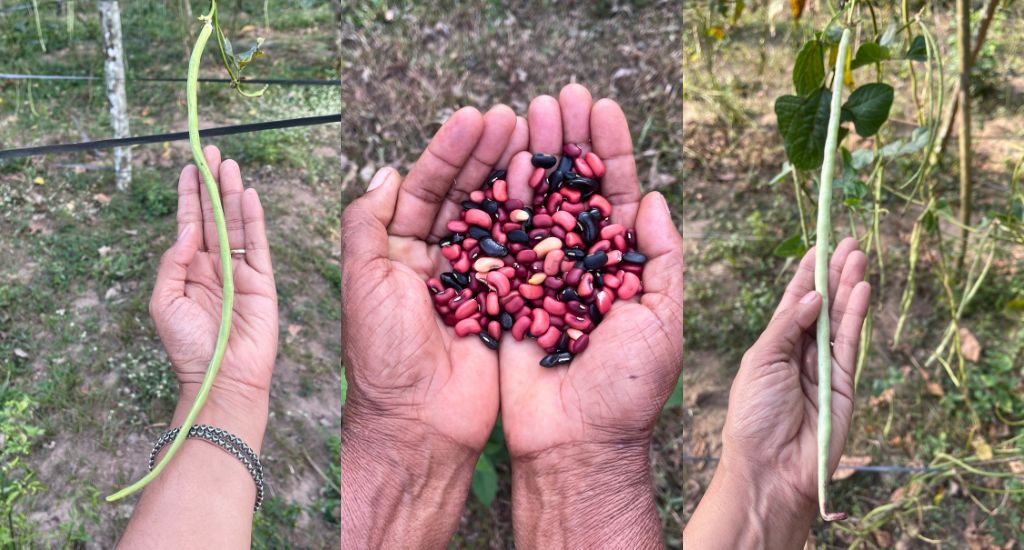Celine Manuel, a dynamic 50-year-old from Marakavu in Wayanad, Kerala, has dedicated her life to women’s empowerment and sustainable agriculture. She envisioned a united front of women in her village, aiming not only to contribute to society but also to achieve economic freedom.
This vision led to the formation of the Thanima self-help group (SHG) in Wayanad, with the support of the Fair Trade Alliance of Kerala (FTAK). This allowed the village women to foster societal change while preserving their local heritage. Today, this group stands as a testament to their commitment, conserving 135 indigenous land races of beans and other vegetable seeds, including gourds, colocasia, tomatoes, chillies and eggplant.
Manuel strongly advocates preservation of indigenous seed varieties over hybrid seeds, which demand high maintenance, costly fertilisers, pesticides and excessive water, resulting in degraded land.
“Hybrid seeds demand excessive resources, leaving the land barren. It’s our duty to safeguard our local seeds,” Manuel asserted.

Her journey to convince the women of her village to unite for this cause was a gradual process. It took time to rally their support, but Manuel’s determination paid off. In the face of the impact of climate change on agriculture, her work gains greater significance. Biodiversity, food security and gender equality are at the forefront of her efforts.
Underscoring the significance, Shinoj, an extension officer at FTAK, said: “Through knowledge-sharing and conservation, these families are investing in the sustainability of agriculture and life on our planet.”
Also Read: Community sows seeds of conservation, saves rare endemic trees
The growth network
FTAK, founded in 2005, works to improve market access and pricing for agricultural products from the remote areas in Kerala’s hill ranges. Over 5,000 families are part of its network, benefiting from access to inputs, credit and land. The SHGs actively engage in various processes — exchanging, bartering, conserving, growing and selling produce — laying the foundation for sustainable growth.

The Thanima SHG is a product of this network. It was entrusted with the responsibility of conserving local bean races, resulting in a collection of over 135 varieties from across Kerala. Apart from beans, it nurtures various vegetables and their seeds.
Besides Manuel, the SHG’s members, including Molly Thankachan, Theyyamma Chacko, Lijo Anish, Nisha Binu, Lija Jinu, Philomina Paily, Beena Saiju, Aliyamma Thampi and Philomina Johnson, are striving for better access to resources and assets. Together, they embraced collective farming, taking calculated risks for greater rewards. The economic benefits for them are substantial — high-quality seeds and organic vegetables translate to increased income.
“Our traditional seeds faced extinction, compelling us to collect and grow them for the future,” said Manuel. By embracing local crop varieties in diversified systems, the path towards food security gains a foothold.

Manuel led the formation of 35 SHGs in Wayanad in 2012 as the district committee president of FTAK. The primary goal was self-sufficiency — cultivating at least five vegetables per family. The strategy of forming smaller, manageable groups proved effective.
Being part of FTAK grants SHG members access to interest-free education loans and funding for ventures like dairy and poultry farming. The SHGs also offer internal loans for income-generating activities or farming investments. Conservation work is executed on leased as well as self-owned lands.
Also Read: Why Kerala needs revival of Kaipad rice
The local connection
The journey’s evolution is best captured by Theyyamma Chacko: “Starting with a small garden, we shifted focus to conserving land races, amassing bean diversity from across Kerala.”
Their collection boasts unique varieties of beans, such as the square-shaped chathura payar, the three-seeded moonumani payar, and the long twine-like valli payar.

Lijo Anish experienced newfound empowerment, confidence and leadership, in addition to organic farming insights from FTAK’s training sessions. Collaborative decision-making within the group guides their cultivation choices and sales strategies.
Anish, along with Saiju and Binu, tends to half an acre, cultivating turmeric and ginger.
“Controlled expenses and generated income are easier when most of the work is in our hands,” Anish explained. Their profits serve daily needs, and more.
Manuel, Thankachan and Chacko formed an informal network to market their seeds. They manage online and offline sales, barter and sharing, while attending seed festivals. These occasions serve as a platform for buyers seeking quality local seeds.
Also Read: Why this woman in Odisha is called a traditional seed guardian

FTAK’s doorstep collection also proves convenient for women farmers. The sale of vegetables and seeds has translated into tangible gains, helping in construction of houses, payment of school fees, facilitation of irrigation through water pump acquisitions, purchase of bicycles and livestock, and even installation of biogas plants at households.
As climate change looms, FTAK’s support arrives at a crucial juncture. However, there’s room for growth in support and market engagement, ensuring rural women receive the backing they deserve. The Thanima SHG’s success serves as a model to be scaled up, encouraging more women’s collectives to address environmental and agricultural challenges.
Also Read: Earth Overshoot Day: A call for sustained conservation efforts
The lead image at the top shows bean seeds harvested and conserved by Thanima SHG in Wayanad (Photo by Lakshmi Unnithan)
Lakshmi Unnithan is a Bengaluru-based sustainability expert and holds a doctorate in horticulture.








